
Blitz BASIC is the programming language dialect of the first Blitz compilers, devised by New Zealand–based developer Mark Sibly. Being derived from BASIC, Blitz syntax was designed to be easy to pick up for beginners first learning to program. The languages are game-programming oriented, but are often found general-purpose enough to be used for most types of application. The Blitz language evolved as new products were released, with recent incarnations offering support for more advanced programming techniques such as object-orientation and multithreading. This led to the languages losing their BASIC moniker in later years.
In computing, cross-platform software is computer software that is designed to work in several computing platforms. Some cross-platform software requires a separate build for each platform, but some can be directly run on any platform without special preparation, being written in an interpreted language or compiled to portable bytecode for which the interpreters or run-time packages are common or standard components of all supported platforms.

MorphOS is an AmigaOS-like operating system designed for Power and PowerPC based computers. The core, based on the Quark microkernel, is proprietary, although several libraries and other parts are open source, such as the Ambient desktop.
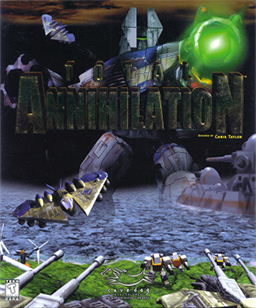
Total Annihilation is a science fiction real-time strategy video game released in September 1997 for Microsoft Windows and Mac OS by Cavedog Entertainment and distributed internationally by GT Interactive. Two expansion packs were released in 1998, The Core Contingency on April 29 and Battle Tactics on July 20, while a medieval-themed spin-off called Total Annihilation: Kingdoms was released on June 25, 1999.
Irrlicht is an open-source game engine written in C++. It is cross-platform, officially running on Windows, macOS, Linux and Windows CE and due to its open nature ports to other systems are available, including FreeBSD, Xbox, PlayStation Portable, Symbian, iPhone, AmigaOS 4, Sailfish OS via a Qt/QML wrapper, and Google Native Client.
A source port is a software project based on the source code of a game engine that allows the game to be played on operating systems or computing platforms with which the game was not originally compatible.
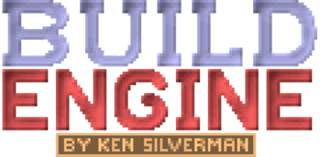
The Build Engine is a first-person shooter engine created by Ken Silverman, author of Ken's Labyrinth, for 3D Realms. Like the Doom engine, the Build Engine represents its world on a two-dimensional grid using closed 2D shapes called sectors, and uses simple flat objects called sprites to populate the world geometry with objects.

Stratagus is a free and open-source cross-platform game engine used to build real-time strategy video games. Licensed under the GNU GPL-2.0-only, it is written mostly in C++ with the configuration language being Lua.
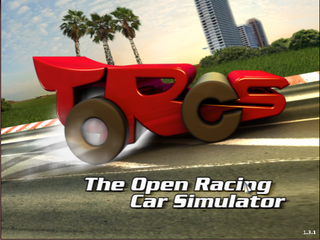
TORCS is an open-source 3D car racing simulator available on Linux, FreeBSD, Mac OS X, AmigaOS 4, AROS, MorphOS and Microsoft Windows. TORCS was created by Eric Espié and Christophe Guionneau, but project development is now headed by Bernhard Wymann. It is written in C++ and is licensed under the GNU GPL. TORCS is designed to enable pre-programmed AI drivers to race against one another, while allowing the user to control a vehicle using either a keyboard, mouse, or wheel input.
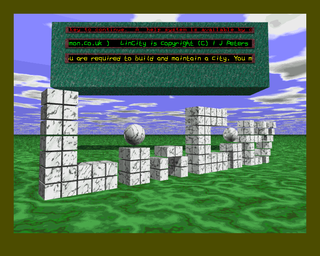
Lincity is a free and open-source construction and management simulation game, which puts the player in control of managing a city's socio-economy, similar in concept to SimCity. The player can develop a city by buying appropriate buildings, services and infrastructure. Its name is both a Linux reference and a play on the title of the original city-building game, SimCity, and it was released under the GNU General Public License v2.

The Spring Engine is a game engine for real-time strategy (RTS) video games. The game engine is free and open-source software, subject to the terms of the GNU General Public License v2.0 or later.

Glest is a free and open-source real-time strategy computer game from 2004. Glest is set in a medieval fantasy world with two factions, and was compared with Warcraft III and the Empire Earth series. The game received positive to mixed reviews from the press, has been downloaded over two million times, and spawned several derivative continuation projects which are under active development.
Mac gaming refers to the use of video games on Macintosh personal computers. In the 1990s, Apple computers did not attract the same level of video game development as Microsoft Windows computers due to the high popularity of Windows and, for 3D gaming, Microsoft's DirectX technology. In recent years, the introduction of Mac OS X and support for Intel processors has eased the porting of many games, including 3D games through use of OpenGL, and more recently, Apple's own Metal API API. Virtualization technology and the Boot Camp dual-boot utility also permit the use of Windows and its games on Macintosh computers. Today, a growing number of popular games run natively on macOS, though as of early 2019, a majority still require the use of Microsoft Windows.
UFO: Alien Invasion is a strategy video game in which the player fights aliens that are trying to take control of the Earth. The game is heavily influenced by the X-COM series, especially X-COM: UFO Defense.
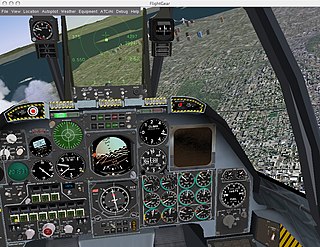
An open-source video game, or simply an open-source game, is a video game whose source code is open-source. They are often freely distributable and sometimes cross-platform compatible.

oVirt is a free, open-source virtualization management platform. It was founded by Red Hat as a community project on which Red Hat Virtualization is based. It allows centralized management of virtual machines, compute, storage and networking resources, from an easy-to-use web-based front-end with platform independent access. KVM on x86-64, PowerPC64 and s390x architecture are the only hypervisors supported, but there is an ongoing effort to support ARM architecture in a future releases.
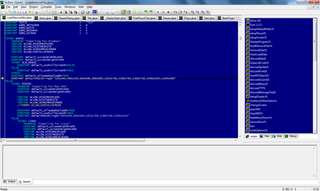
GLBasic is a commercial BASIC programming language that can compile to various platforms including Windows, Linux, Mac OS X, and some handheld devices. The language is designed to be simple and intuitive.

Widelands is a free and open-source, slow-paced real-time strategy video game under the GNU General Public License. Widelands takes many ideas from and is quite similar to The Settlers and The Settlers II. It remains a work-in-progress game, with development still required in graphics and bug-fixing. The game runs on several operating systems such as AmigaOS 4, Linux, BSD, Mac OS X, and Windows.

MegaGlest is a free and open source real-time strategy computer game in a fantasy world, mixing elements of re-imagined past civilizations, magic and steampunk. It is an actively developed fork of the 2004 game Glest, which is no longer under development.
















